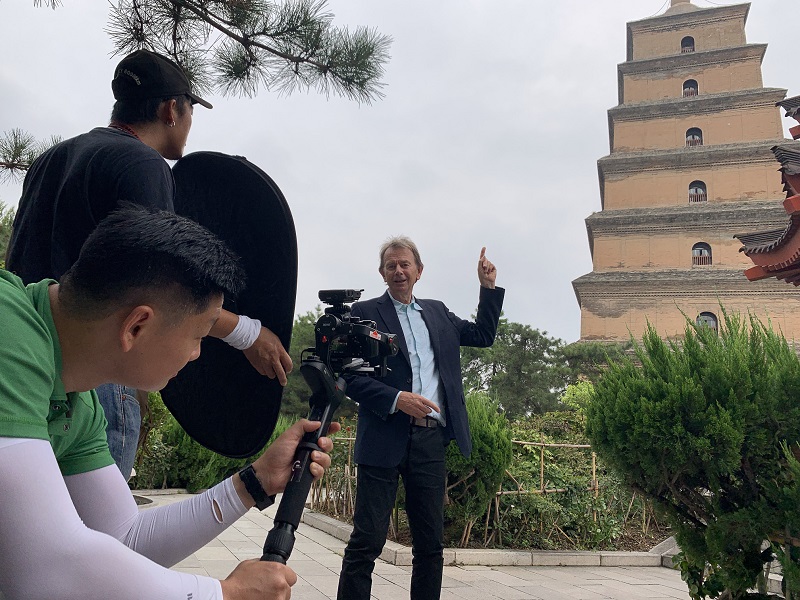"Unless you understand China, you won’t understand what are truly common values in human society on Earth, or what are just Western idiosyncrasies." – Michael Wood quoted Simon Leys in his interview with China today.
Michael Wood is no stranger to Chinese TV audiences or readers. A famous British historian, broadcaster, and author, he has presented lots of well-known television documentary series from the late 1970s to the present day. His China-themed works – The Story of China, The Story of China’s Reform and Opening-up, and Du Fu: China’s Greatest Poet – have all proved to be smash hits among British and Chinese audiences.
“China is simply the other pole of the human mind,” said Wood in an interview with China Today, quoting Simon Leys, a distinguished scholar of classical Chinese art and literature. For a Westerner, it’s always a journey of discovery, he added, noting that China is “the essential other, without the knowledge of which the West would not be able to perceive the outline and the limits of its own self.”

Michael Wood is doing a film shooting at the Big Wild Goose Pagoda in Xi’an, Shaanxi Province, with his cameramen, on September 16, 2019.
Hooked on China
Born in Manchester in 1948, Wood’s fascination with China and Chinese culture began in his schooldays with A. C. Graham’s Poems of the Late T’ang. “[It was] one of those books that opened a window on a world one could never have dreamed existed,” he said.
Later, as a graduate student at Oxford University, sharing a house with a sinologist was another eye-opening period when Wood encountered revelatory books like Arthur Waley’s The Book of Songs, and Chu Ci (also known as The Songs of the South), containing haunting masterpieces like Li Sao. “At that time, among the larger-than-life characters who came through our kitchen was David Hawkes, who as a student at Peking University had been at Tian’anmen Square on October 1, 1949, when the People’s Republic of China was founded, and who translated what he called ‘the novel of the millennium’ – The Dream of the Red Chamber,” said Wood.
“Most of all I loved Autumn Wastes by Du Fu, even though at first I found it hard to understand even in English!” said Wood, adding that he loves the quatrains of Du Mu to this day. He said, “Arthur Graham’s translations are still terrific, and his comparisons of Chinese and Western poetry very intriguing.”
In the early 1980s, Wood came to China for the first time, visiting Lanzhou in west China’s Gansu Province and Kaifeng in central China’s Henan Province. “China was coming out of a very tough period and people you met in the street often seemed traumatized,” said Wood, “but they were always affable, friendly, and welcoming.” He still remembered how many people wanted to practice their English after watching English classes on TV. “I came away feeling how much I liked being with the Chinese people, and that I wanted to go back.”
As a historian, Wood seemed to be destined to witness history. The changes in China since the 1980s were absolutely incredible, such as the greatest poverty reduction in human history. Wood said that even the U.S. scholars James Stapleton Roy and Ezra Vogel, whom he interviewed in 2018, both saw China’s reform and opening-up as the greatest event in modern world history.
“China is a vast country with huge regional variations in language, dialect, landscape, food, music, and culture, and with over 3,000 years of records of every kind you can dive endlessly into its history – it is inexhaustibly interesting,” said Wood, confessing that once hooked, it’s impossible not to want to know more.
A Journey of Discovery
In 2016, BBC’s landmark documentary – The Story of China, written and presented by Wood, was broadcast worldwide and received widespread attention and praise. It was then followed by two other works – The Story of China’s Reform and Opening-up in 2018, and Du Fu: China’s Greatest Poet in 2020.
Wood and his team have received a huge amount of feedback from Chinese audiences. For example, in his documentary, he visited the manufacturing plant of the Fuxing bullet train, where a Chinese engineer told him, “By 2025, the national high-speed rail line will reach 38,000 kilometers. And we are always ready to go abroad.” The conversation was put on Douyin – the Chinese version of Tik Tok, which received 301,000 likes and 11,000 positive comments from Chinese netizens.
Xinhua, China’s state news agency, said that Wood’s documentary had “transcended the barriers of ethnicity and belief and brought something inexplicably powerful and touching to TV audiences.” “It is one of the nicest reviews I’ve ever had, but it is always a risky thing to make films about another culture, so one must approach it in a humble way,” he said.
As a filmmaker, the challenge is trying to convey to a general TV audience in the West, in a short span of time, the arc, or trajectory, of Chinese history and to also highlight some of the big themes. Everywhere they went during filming people were willing to offer unsolicited help and always ready to share stories of their past.
“There’s always something new,” said Wood, adding that the ways the Chinese do things and think about things are often very different to Westerners, so it’s always a journey of discovery.
While the outbreak of the COVID-19 pandemic has put everything on hold, Wood has not stopped working on new projects. He is writing a short book – In the Footsteps of Du Fu, which will include diaries, maps, and photos. He admitted that writing such a book had been on his mind since his schooldays. As the U.S. sinologist Stephen Owen said, “There’s Dante, there’s Shakespeare, and there’s Du Fu; they helped create the emotional vocabulary of their respective cultures.”
Talking about future TV work, Wood would like to return to China with his colleagues at Maya Vision. They are currently thinking about doing a series, possibly online as well as on TV, of short films which they are calling Parallel Lives: for example Confucius and Socrates, Sima Qian and Herodotus, Su Song and Leonardo da Vinci, Li Qingzhao and Christine de Pisan, Cao Xueqin and Jane Austen, and so on. The aim is to compare and contrast iconic characters from both cultures in short pithy snapshots, in order to open up ideas about the similarities and differences, and the common connections between the East and the West.
Ordinary Lives vs. the Big Picture
Being a wonderful storyteller, Wood is adept at using a grand narrative to tell the sweeping history of China from ancient times to the present, and captures the big picture without losing sight of the human details, which is very well reflected in his book The Story of China: A Portrait of a Civilization and Its People published in September 2020.
“A book is a different creature from a TV show produced for mainstream audiences; it allows a much meatier narrative and deeper engagement with landscapes and stories,” said Wood. “But you still try to use what I call ‘the film maker’s eye,’” he added.
In this book, he has put great effort into telling the story of some writers and characters that particularly interested him and the people from Chinese history whose lives and works illuminate the big picture.
He gave some examples: Li Qingzhao – who described the experiences of the fall of the Northern Song Dynasty, her wanderings as a refugee, and her experience as a woman in a patriarchal society, including the bitter story of her marriages. Or Cao Xueqin: not only a captivating novelist, but one who shared his life experiences and the rise and fall of his family over four generations.
“There have been amazing new finds – some letters by soldiers in the Qin military – the real-life Terracotta Army – writing home to mum, or letters from Han garrisons on lonely watchtowers in the wilds of the Silk Road,” said Wood. “They gave us the kind of immediacy we get in Britain, say, from the Vindolanda tablets on Hadrian’s Wall in the Roman empire.”

Michael Wood departing with his film crew at Changsha Airport, on September 23, 2019.
Exchanges Matter More Than Ever
While discussing the continuity of Chinese civilization, Wood described China as the oldest living civilization in the world. “We live in a small world and we are all human beings – as Confucius would say. His often simple maxims still crystallize some of the key traits in Chinese culture: civility, duty, hospitality – and humor too,” said Wood.
China and the U.K. “should always try for dialogue and understanding,” he said, adding, “The differences in our histories and cultures need not be a barrier but a source of enrichment; our different social systems and developmental history don’t block our communications. It is corny and trite to say so, but mutual understanding and exchange can work wonders.”
He gave another example. As a governor of the Royal Shakespeare Company (RSC) for 12 years and still a trustee of the Shakespeare Birthplace Trust, he knows that many interesting exchange projects are being talked about: the RSC is sponsoring a complete new Chinese translation of Shakespeare’s works and planning on getting English directors to direct his plays in China. In the post-pandemic world, they hope to continue their Chinese Translations Project, bringing Chinese classics to Western audiences in English – like Snow in Midsummer. “In both cultures, the poets are the real voices of the people and a great way for our cultures to find common ground,” he said.
Noting that 2022 marks the 50th anniversary of the diplomatic relations between China and the U.K., Wood stressed, “We live on a small planet, and friendship and cooperation must be the way forward.” He further indicated that both countries can play a positive role, and can contribute to long-lasting, open, and win-win China-U.K. relations. “We should use our best influence to make a better world, and to work together towards a shared future for humankind,” he concluded.